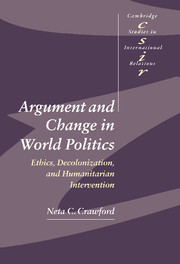Book contents
- Frontmatter
- Contents
- List of illustrations
- List of tables
- Acknowledgments
- Introduction
- 1 Argument, belief, and culture
- 2 Ethical argument and argument analysis
- 3 Colonial arguments
- 4 Decolonizing bodies: ending slavery and denormalizing forced labor
- 5 Faces of humanitarianism, rivers of blood
- 6 Sacred trust
- 7 Self-determination
- 8 Alternative explanations, counterfactuals, and causation
- 9 Poiesis and praxis: toward ethical world politics
- Appendix. African decolonization
- Select Bibliography
- Index
- CAMBRIDGE STUDIES IN INTERNATIONAL RELATIONS
6 - Sacred trust
Published online by Cambridge University Press: 22 September 2009
- Frontmatter
- Contents
- List of illustrations
- List of tables
- Acknowledgments
- Introduction
- 1 Argument, belief, and culture
- 2 Ethical argument and argument analysis
- 3 Colonial arguments
- 4 Decolonizing bodies: ending slavery and denormalizing forced labor
- 5 Faces of humanitarianism, rivers of blood
- 6 Sacred trust
- 7 Self-determination
- 8 Alternative explanations, counterfactuals, and causation
- 9 Poiesis and praxis: toward ethical world politics
- Appendix. African decolonization
- Select Bibliography
- Index
- CAMBRIDGE STUDIES IN INTERNATIONAL RELATIONS
Summary
But if the extent of the offence be measured by the professions of high moral purpose previously laid claim to, then, iniquitous as has been the conduct of the European Governments toward their own peoples, it pales in comparison with their conduct towards the peoples of Africa, whose territory they parceled out among themselves with the name of God upon their lips, of whose rights they declared themselves to be the jealous guardians, whose helplessness they invoked to justify their own “protective” aegis, and to whom they sent their missionaries that these backward folk might be duly instructed in the gospel of the Prince of Peace. “Civilizing” the African, forsooth! There was a pretty strong element of barbarism in Europe's civilizing methods in Africa before the war.
Whether or not people speak in good faith, they cannot say just anything they please. Moral talk is coercive; one thing leads to another.
The previous chapter showed how the anti-slavery movement's humanitarian arguments rationalized colonial expansion in Africa, yet also denormalized and began to delegitimize some colonial practices. In this chapter I show how reform arguments came to dominate colonial discourse, and how, with the League of Nations Mandate system, new normative beliefs first articulated by the colonial reform movement were institutionalized. The paternalistic and aggressive humanitarianism of the Berlin West Africa Conference, which was coupled with conquest, gradually gave way to the less paternalistic beliefs characteristic of the Aborigines Protection Society and of W.E.B. Du Bois, E.D. Morel, and Woodrow Wilson.
- Type
- Chapter
- Information
- Argument and Change in World PoliticsEthics, Decolonization, and Humanitarian Intervention, pp. 249 - 290Publisher: Cambridge University PressPrint publication year: 2002

